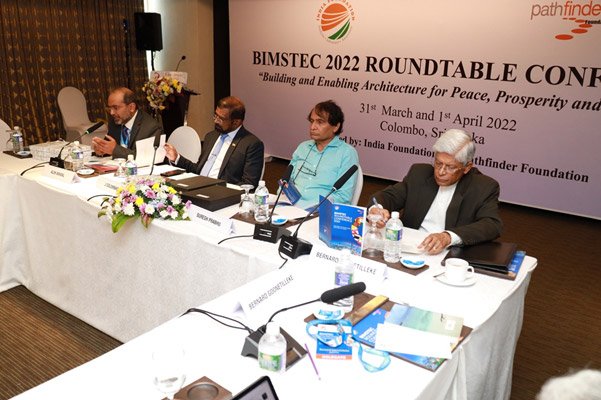31st March – 1st April 2022
Colombo, Sri Lanka
“BIMSTEC: Building an Enabling Architecture for Peace, Prosperity and Partnership”
EVENT REPORT
The BIMSTEC roundtable conference was organized by India Foundation jointly with Pathfinder Foundation on the side lines of the Fifth Summit of the Heads of State/Government of the Bay of Bengal initiative for Multi-sectoral Technical and Economic Cooperation (BIMSTEC) in Colombo, Sri Lanka from 31st March to 1st April, 2022. The two-day conference was spread over five sessions where thought leaders from the seven BIMSTEC member states including government officials, parliamentarians, social activists, academics, scholars and domain experts in the fields of security, energy, connectivity, economy, culture, education, and media, deliberated on the conference theme ‘BIMSTEC: Building an enabling architecture for Peace, Prosperity and Partnership’.
Inaugural Session
The inaugural session of the conference was graced by Prof. G L Peiris, Minister of Foreign Affairs, Sri Lanka, Amb Gopal Baglay, High Commissioner of India to Sri Lanka, Mr Tenzin Lekphell, Secretary General, BIMSTEC and Vice Admiral Shekhar Sinha, former FOC-in-C Western Naval Command, and Member, Board of Trustees, India Foundation.
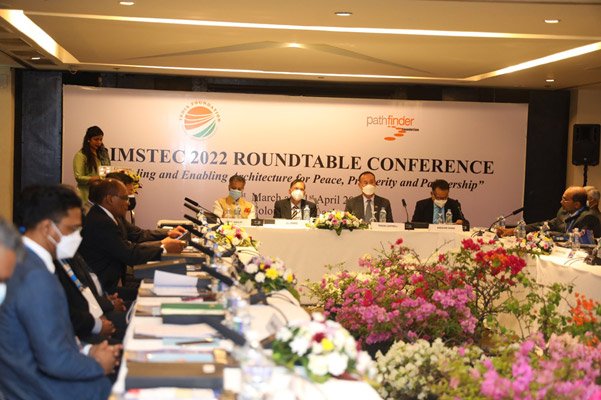
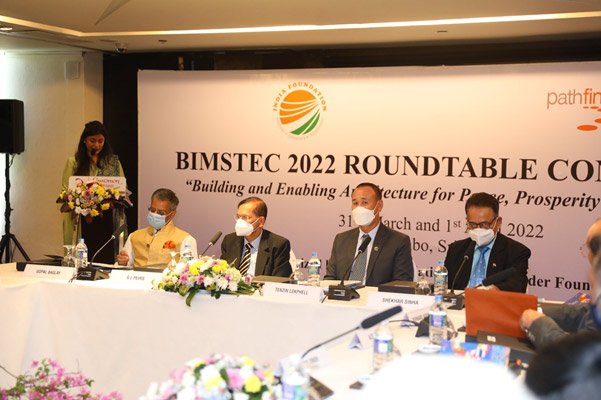
In his introductory address, Amb. Gopal Baglay appreciated the historic achievements of the 5th BIMSTEC Summit, namely, the signing of the BIMSTEC Charter; legal assistance agreement on criminal matters; the Memorandum of Association on establishment of BIMSTEC technology transfer facility in Colombo; and the MOU on cooperation between diplomatic, academics and training institution of the member countries. The Ambassador also noted India’s active support to BIMSTEC’s vision and India’s announcement of support of USD 1,000,000 for the BIMSTEC Secretariat at the 5th BIMSTEC Summit. He recalled the address of Prime Minister Narendra Modi at the 5th BIMSTEC Summit, reiterating the importance of cooperation within BIMSTEC nations as a bridge for their prosperity, connectivity and security. Stressing on the importance of inter-connectivity amongst BIMSTEC nations, the ambassador appreciated and welcomed the BIMSTEC Master Plan on transport, which among other things, highlights the importance of ferry connectivity, for example, between India and Sri Lanka and between India and Bangladesh. BIMSTEC nations will also gain from the establishment of a coastal shipping ecosystem, port facilities and power grid connectivity in the Bay of Bengal region, he said.
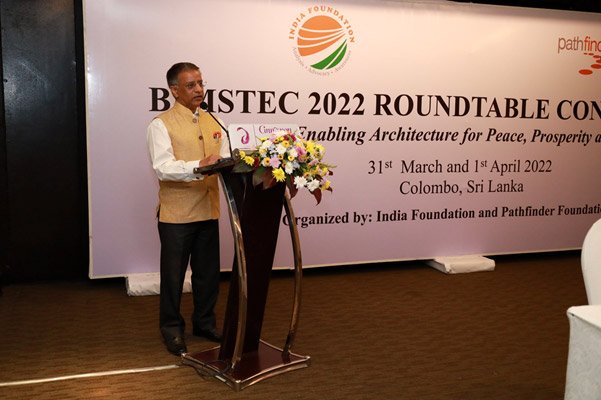
Mr Tenzin Lekphell stated that the signing of the BIMSTEC charter at the 5th BIMSTEC Summit was a historic & momentous occasion which will provide BIMSTEC the legal status and institutional framework to pursue its objectives, codifying its rules of procedure and setting clear targets to achieve the goals of Bay of Bengal regional cooperation. He noted that the signing of the charter is also an opportune moment for BISMTEC to consider enhancing its partnerships and linkages with regional and international organizations and its visibility on the international stage, including obtaining observer status with international organizations. The 5th BIMSTEC Summit has also adopted the BIMSTEC master plan for transport connectivity, which is a big achievement for BIMSTEC, as transport connectivity is the fundamental requirement of regional cooperation and integration to accelerate economic growth and social development. The master plan has 267 projects worth USD 124 billion and presents a comprehensive 10-year strategy action plan covering transport linkages in roads, railways, ports, inland water transport, airports and multimodal transport, for which the member states can now identify projects, seek finance, build partnerships and implement these projects. The Secretary General concluded his remarks by stating that the BIMSTEC member states, as a consequence of coming into force of the Convention on Cooperation in combating international terrorism, transnational organized crime and illicit drug trafficking, have been instituting coordinating mechanisms to share information on international terrorism, transnational organized crime and illicit trafficking in narcotic substances with the view to provide mutual assistance in the prevention, investigation and suppression of such crimes in the BIMSTEC region.

In his key note address, Mr G L Peiris pointed out the growing disenchantment with the multilateral institutions under the UN framework as all the more reason to place a special focus on regional institutions such as BIMSTEC. Stating that BIMSTEC is a repository of huge potential, both in terms of human resources and natural resources, he pointed out that the seven countries that comprise BIMSTEC are home to 1.6 billion people and that the Bay of Bengal, spread over 2.6 million square kilometres of ocean, is by far the largest bay in the world. This indicates the magnitude of the resources that are encompassed within BIMSTEC. He noted that the trajectory of BIMSTEC’s development in the future lies on our understanding that the BIMSTEC framework is for the benefit of all of us and in a sense BISMTEC could be developed as a bridge between the SAARC and ASEAN. The minister spoke of the bilateral potential between Sri Lanka and the other BIMSTEC nations and stated that the relations among the seven countries is absolutely crucial in addressing the problems that we are facing in the modern world. Noting the support of the BIMSTEC nations to an international rules-based order, the Minister reiterated support to the United National Convention on the law of the Sea (UNCLOS), which governs the regime of the oceans. He further noted that the relationship among member countries must not be confined to government-government relationships. Private sector, civil society, academics and professional are important for BIMSTEC to be a multifaceted, rich and rewarding relationship, he said. Appreciating the BIMSTEC nations for their mutual support and assistance during the COVID pandemic, the minister stated that the BISMTEC’s future trajectory is uniformly positive.
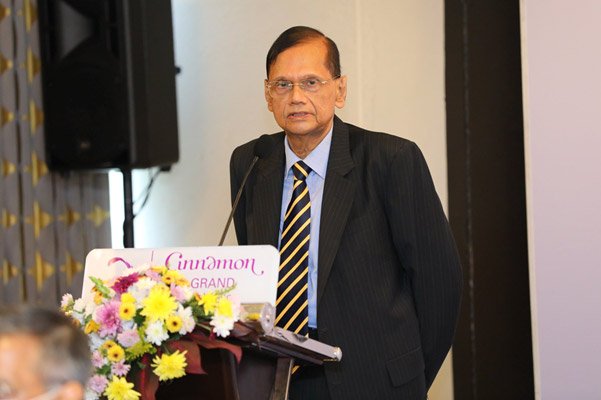
The first day of the conference concluded with a dinner address by the guest of honour, H.E. Basil Rajapaksa, the Hon’ble Minister of Finance, Government of Sri Lanka.
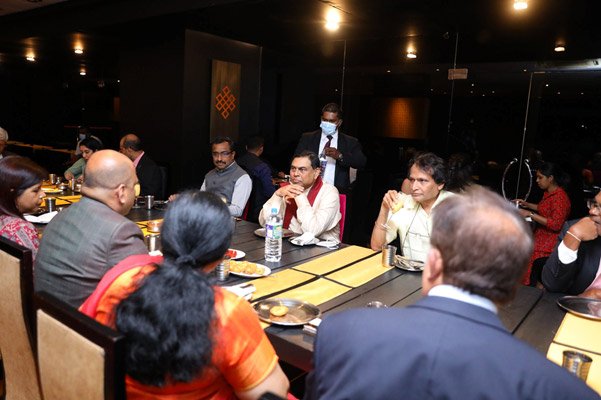
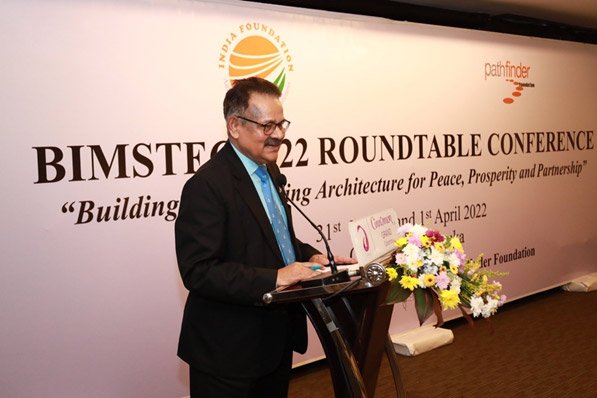

Day 2
Five scientific sessions were held on five sub-themes as under:
- Leveraging blue economy potential and enabling business linkages through trade and investment in the Bay of Bengal.
- Cultural and Civilization linkages.
- Physical and digital connectivity in the Bay of Bengal region.
- Role of BISMTEC in managing regional security challenges and promoting peace.
- Building brand BIMSTEC: Government and M
The first working session on ‘leveraging blue economy potential and enabling business linkages through trade and investment in the Bay of Bengal’ was moderated by Shri Ram Madhav, Member, Board of Governors, India Foundation. Prof. Sirimal Abeyratne Professor of Economics, University of Colombo, Sri Lanka discussed the importance of collective initiative for optimum utilisation of the pool of BIMSTEC resources to fully exploit the opportunities for all countries in the region. Prof. Mustafizur Rahman, Distinguished Fellow at Centre for Policy Dialogue (CPD), Dhaka, Bangladesh, brought out the perspectives of the smaller economies in the region and the need to develop value chains to help the smaller economies to enter the global markets. Prof. Sangam Shrestha, Professor and Chair, Water Engineering and Management Program at the Asian Institute of Technology (AIT), Bangkok, Thailand, reiterated the importance of research on how climate change, climate variability and climate extremes impact ocean resources, building regional cooperation and the need for capacity building for integrated ocean governance. Dr Rupa Vasudevan, Founder and Chancellor, Bharatiya Engineering Science and Technology Innovation University, Andhra Pradesh, India stressed on the importance of building human capital in the region through education and research.
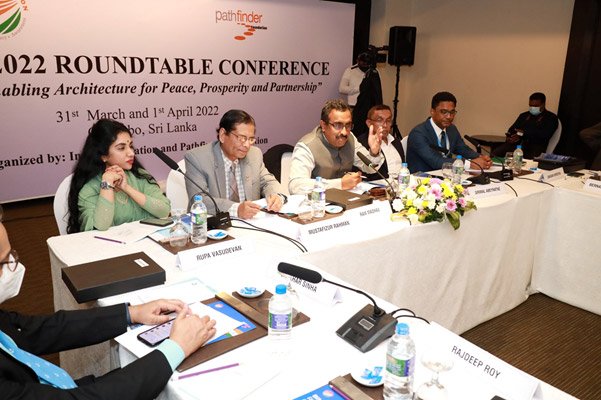
The second working session on cultural and civilisational linkages was moderated by Ambassador Sumith Nakandala, Senior Director, Bandaranaike Centre for International Studies, Colombo, Sri Lanka. The speakers in this session were Shri Rajdeep Roy, Member of Parliament, India, Prof. Sunaina Singh, Vice-Chancellor, Nalanda University, India, Ms Ayreen Khan Researcher, Artist and Social Actor/Activist, Founder, iCan Foundation, Bangladesh and Prof. Anura Manatunge, Director-General, Department of Archaeology, Sri Lanka. During this session, the deep-rooted and historic cultural and civilizational linkages amongst the BISMTEC nations were enumerated and the need to strengthen them further for the common benefit of all in the region was emphasized.
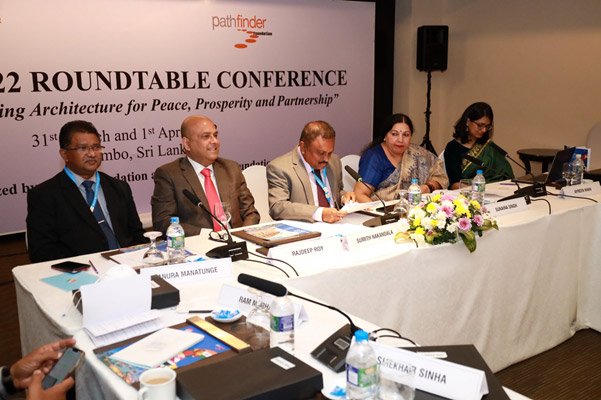
The third scientific session on physical and digital connectivity in the Bay of Bengal was moderated by Shri Rohan Samarajiva, Chairman, LIRNE Asia, Sri Lanka. Ms Veena Sikri, former ambassador and Professor, Jamia Millia Islamia, New Delhi, spoke about enhancing road transport, railway connectivity, port and maritime transport connectivity. Dr Nishchal Pandey Director, Centre for South Asian Studies, Nepal, stressed on introducing visa on arrival facility for all BIMSTEC nations. Dr Naing Swe Oo Senior Advisor, Myanmar Institute of Strategic and International Studies (MISIS), Myanmar stressed on the need for better physical connectivity and Dr. Sankalpa Gamwarige Department of Electronics and Telecommunication Engineering, University of Moratuwa, Sri Lanka explained the need for enhancing digital connectivity with the help of technological advancements.
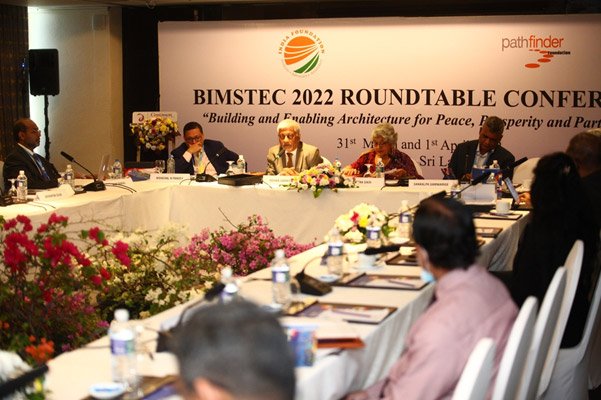
The session on role of BIMSTEC in managing regional security challenges and promoting peace was moderated by Prof. C Raja Mohan, Senior Fellow, Asia Society Policy Institute, India. The speakers in this session, were Maj Gen Mohammad Maksudur Rahman, Director-General of Bangladesh Institute of International and Strategic Studies, Bangladesh, Prof. Rohan Gunaratna, Director-General, Institute of National Security Studies, Sri Lanka; Maj Gen Binoj Bansnyat, former Deputy Chief of Staff, Nepal Army and currently Political and Security Analyst, and Mr. Nitin Gokhale, Founder, Strategic News Global, India. The speakers gave their views on the growing security challenges in the region and the need for concerted efforts by all member countries to tackle security threats and promote regional peace and stability.
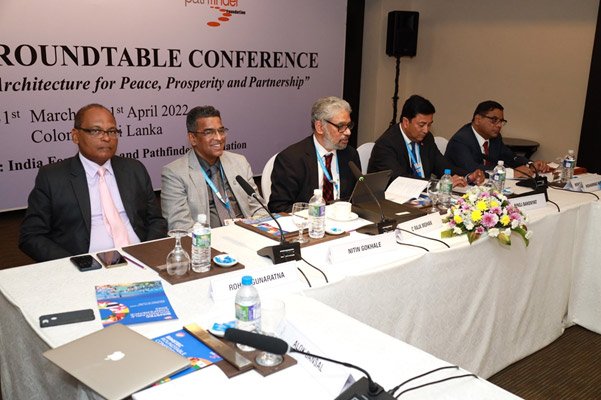
The session on the role of governments and media in building brand BIMSTEC was moderated by Shri Anil Trigunayat, former ambassador, India. The speakers were Shri Prasad Kariyawasam, former foreign secretary, Sri Lanka, Shri Shamsher Chowdhary BB, former foreign secretary, Bangladesh and Shri Shambhu Ram Simkhada, former Permanent Representative of Nepal to the United Nations. During the session, the role of building BIMSTEC identity amongst the member nations by balancing individual national interest with the collective interests of all nations was enumerated. The role of governments, media and civil society in building brand BIMSTEC was also deliberated upon by all the speakers.
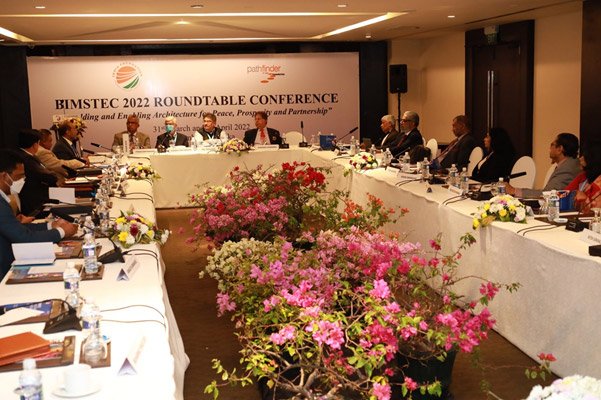
Valedictory Session
The Valedictory Session was graced by Shri Suresh Prabhu, MP & former minister, Govt of India and Admiral J. Colombage, Foreign Secretary, Govt of Sri Lanka. Shri Suresh Prabhu narrated how problems in one country effect the world at large by taking covid as an example and explained how BIMSTEC nations can shape the future of the region by bringing the hearts of its people together. Admiral Colombage laid stress on the strong cultural and civilizational ties between the BIMSTEC nations and reiterated the opportunities presented by BIMSTEC for the common well-being of the region and its people. The concluding remarks of the conference were presented by Ambassador Bernard Goonetilleke, Chairman, Pathfinder Foundation.
